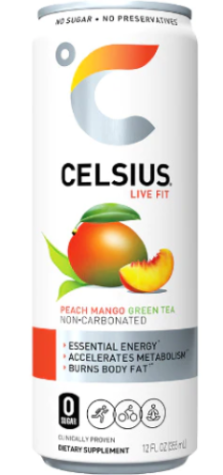Fuel or Foul?
Celsius collection inside students, Evia Marszelak’s locker. (Photo Courtesy of Eva Marszelak
May 27, 2023
Students question whether the boost that energy drinks provide makes up for the effects they have on your health.
Walk into any classroom at Milford High School, and you are sure to find an energy drink on somebody’s desk. “It helps me stay awake and be energized,” Sophomore Evia Marszelak said when asked about her energy-drinking habit. “I would say I drink at least five a week,” she adds. Instead of coffee, many students are choosing Alani Nu’s, Celsius, Red Bull and Monster. Do students really understand what they are putting into their bodies? Are all of the health consequences worth the boost of energy they may receive?
First, it is important to understand what ingredients in energy drinks provide that boost of alertness. Aside from caffeine, which ranges from 50-250 mg, energy drinks often contain other stimulants like guarana, taurine, and L-carnitine, which are usually not found in coffee. Although there is a lack of scientific evidence, companies claim that these ingredients are what enhance the ability to stay focused and energized. The appeal is also found in the sugar or sweeteners, which range from about 40-50 grams in each can. The dopamine that releases when indulging in an energy drink is what makes it so addicting for many, especially teenagers according to npr.
The benefits of energy drinks are easily apparent to those who drink them. Many high schoolers have a busy schedule outside of school and sleep is not exactly high in their priorities. The CDC data shows that more than 72 percent of students are not getting enough sleep. They say that for teens ages 13-18, it is recommended to get around 8-10 hours of sleep. With the burden of sports, clubs and homework this simply does not seem possible for many students. During the school day is when that lack of sleep seems to catch up to many students. Energy drinks are the perfect remedy, helping students feel more alert even when they aren’t exactly well rested. They are fairly cheap, accessible and sweeter which attracts many teens who dislike the bitterness of coffee. So, why are many health experts urging people to stop consuming energy drinks?
“Energy drinks may enhance one’s ability to stay alert, however, because of the ingredients it can also cause shakiness, heightened levels of anxiety, heartbeat irregularities, high blood pressure or digestive distress,” Milford High School Health Teacher Chris Eichbauer said. As reported by the CDC, although energy drinks are advised against by the American Academy of Pediatrics, the number of adolescent consumers, around 30-50%, is alarmingly high. “The caffeine in them stimulates the nervous system and its reaction time can lead to increased heart rate, high levels of anxiety, sleep abnormalities and increased blood pressure.” Also, the “added dietary sugars are one of the leading causes in developing Type II diabetes and obesity.” he states. Eichbauer urges students truly struggling with an inability to stay focused to seek professional guidance. “Too many people, young and old alike, use energy drinks as a form of trying to address health issues that would be better solved by a health professional in a safer and more conducive manner.”
Students have also begun to recognize the negative effects; however, having them daily has caused a dependency. “It makes me feel jittery,” said Ellie Ballard.
Evia Marszelak agrees, “Sometimes I can’t stop shaking or my heart rate is too fast. I also can’t have them before cheering because I either feel nauseous or it’s hard for me to control my body from shaking.”
Needless to say, there are definitely some notable consequences from these popular beverages. Although the list of cons may seem overwhelmingly long, having one once in a while is not likely to have any severe long term effects. In addition, each energy drink is created differently and a more “healthier” option may contain less caffeine doses, and less sugar, while also providing consumers with vitamins and minerals. According to the Food Network some beverages that give you a boost of energy but are safer than other energy drinks are tea, coffee, Red Bull, and Bolt24. These are FDA regulated unlike many drinks and tea especially has antioxidants that help fight off disease and boost your immune system, according to Penn Medicine. If you feel like the only way to feel alert is after consuming energy drinks, it is important to note that there are other ways to feel more awake. Keeping your body hydrated, eating a filling breakfast and maintaining a consistent sleep schedule all have positive effects on alertness. For the question fuel or foul, it is safe to say that it is a little bit of both.

